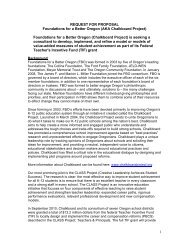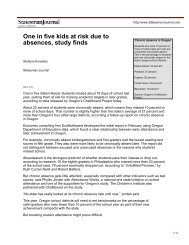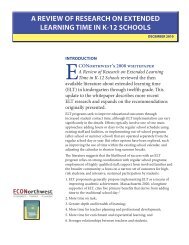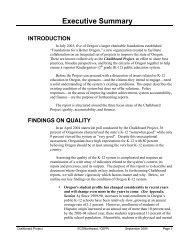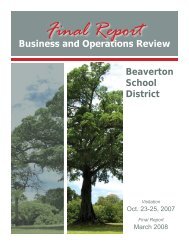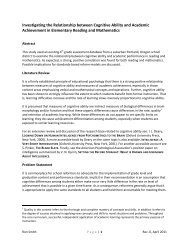TA P P I N G T H E P O T E N T I A L : R E TA I N I N G A N D D E V E L O P I N G H I G H - Q U A L I T Y N E W T E A C H E R STHE SOLUTION: COMPREHENSIVE INDUCTIONFOR EVERY BEGINNING TEACHERAddressing attrition and <strong>the</strong> lack ofinduction requires a much morecomprehensive and systematic solutionthan currently exists in most states anddistricts. All beginning teachers needcomprehensive induction if we are toretain <strong>the</strong>m and help <strong>the</strong>m develop intohigh-quality professionals.“Comprehensive induction” is defined asa package of supports, development, andstandards-based assessments provided tobeginning teachers during at least <strong>the</strong>ir firsttwo years of full-time professional teaching.High-quality, comprehensive induction thatretains and develops new teachers includes<strong>the</strong> following components:• structured mentoring from carefully selectedteachers who work in <strong>the</strong> same subjectarea, are trained to coach newteachers, and can help improve <strong>the</strong>teacher’s practice;• common planning time <strong>for</strong> new teachers tocollaborate with <strong>the</strong>ir mentors, o<strong>the</strong>rteachers, and school leaders across alllevels of experience;• intensive professional development activities<strong>for</strong> new teachers that result inimproved teaching that leads to studentachievement;• participation in a network of o<strong>the</strong>r teachersoutside <strong>the</strong> local school; and• a standards-based assessment and evaluationof every beginning teacher to determinewhe<strong>the</strong>r he or she should move <strong>for</strong>wardin <strong>the</strong> teaching profession.Solving New Teacher Attrition:More Than MentoringSince <strong>the</strong> early 1980s, increasing numbersof states and districts have tried toretain and develop <strong>the</strong>ir teachers byadopting some <strong>for</strong>m of induction. Inmost districts and <strong>for</strong> many states, inductionis equated with mentoring.Mentoring is a <strong>for</strong>mal or in<strong>for</strong>mal relationshipthat offers new teachers coaching,support, and feedback from moreexperienced teachers. The popularity ofmentoring is clear. In <strong>the</strong> 1999–00 schoolyear, 79 percent of new teachers in <strong>the</strong>United States participated in some type of“<strong>for</strong>mal” induction program; two-thirds of<strong>the</strong>m were given mentors. 59While mentoring is <strong>the</strong> most widelypracticed component of induction, mentoringby itself is not enough to retainand develop teachers. Mentoring programsvary widely, and many do little“Comprehensive induction”is defined as a package ofsupports, development,and standards-basedassessments provided tobeginning teachers duringat least <strong>the</strong>ir first two yearsof full-time professionalteaching.Mentoring by itself is notenough to retain anddevelop teachers.11
A L L I A N C E F O R E X C E L L E N T E D U C AT I O NComprehensive inductionrequires a substantialinvestment of time,money, and resources.The good news is that <strong>the</strong>investment pays off.more than ask mentors to check in withnew teachers a few times per semester tochat. Some mentors meet with new teachersregularly <strong>for</strong> encouragement butnever observe or evaluate <strong>the</strong>m in <strong>the</strong>classroom. Emotional support is important<strong>for</strong> growing professionals, but it is apale substitute <strong>for</strong> rigorous guidanceabout how to teach. Even in an idealworld, where new teachers are matchedwith excellent mentors, beginning teachersneed <strong>the</strong> additional opportunities—such as networking with o<strong>the</strong>r teachersoutside <strong>the</strong> school or receiving standardsbasedassessment—that come with comprehensiveinduction.The Benefits of ComprehensiveInductionComprehensive induction requires asubstantial investment of time, money,and resources. The cost of comprehensiveinduction varies in terms of release timeand compensation <strong>for</strong> mentors. Usingmodels from Cali<strong>for</strong>nia and Connecticut,<strong>the</strong> approximate average cost of inductionis $4,000 per teacher, per year.The good news is that <strong>the</strong> investmentpays off. Using a two-year program inCali<strong>for</strong>nia as a model, Anthony Villar of<strong>the</strong> New Teacher Center, University ofCali<strong>for</strong>nia, Santa Cruz, found that comprehensiveinduction pays $1.37 <strong>for</strong>every $1 invested. 60Historically, <strong>the</strong> benefits of comprehensiveinduction have been hard to evaluate,leaving few studies and little evidence on<strong>the</strong> true value of induction. However,Villar’s work identifies and quantifiesthree major benefits of induction:• reduced attrition;• improved teacher quality; and• improved student achievement.Reduced attrition. Induction cuts attritionrates in half. 61 And teachers whoexperience all <strong>the</strong> components of comprehensiveinduction are more likely toremain in teaching than those who onlyreceive mentors. 62 By reducing attrition,school districts can make <strong>the</strong> dollarsspent on recruiting, hiring, and developingteachers more effective and provide<strong>the</strong>ir students with teachers who havegrowing expertise.Improved teacher quality. In his report,Villar found that comprehensive inductionmore rapidly develops teachers, moving<strong>the</strong> skill level of a new teacher to thatof a fourth-year teacher within <strong>the</strong> span ofone year. In addition, all teachers, not justnovices, benefit from induction.Experienced educators who serve asinduction leaders, mentors, or coachesbuild leadership skills and refine <strong>the</strong>irown practice as <strong>the</strong>y help o<strong>the</strong>r teachers.They also gain a sense of job satisfaction.By improving satisfaction, leadershipamong teachers, and teaching quality,induction can vastly improve <strong>the</strong> climateof schools and help retain its veteranteachers as well as its new ones.Improved student achievement.Fur<strong>the</strong>rmore, because inducted teachers“move more quickly beyond issues ofclassroom management to focus oninstruction,” <strong>the</strong>y use practices thatimprove student achievement. 63 Inductedteachers motivate diverse students toengage in productive learning activities,and <strong>the</strong>y better assess <strong>the</strong>ir students’learning needs. 64 Inducted teachers alsodevelop better teaching practices because<strong>the</strong>y think about how <strong>the</strong>ir teaching influencesstudent learning. 6512






